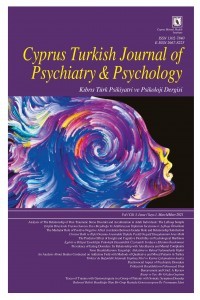Covıd-19 Servis Ve Yoğun Bakım Ünitelerinde Çalışan Hemşirelerin Tükenmişlik Düzeyleri Ve İlişkili Faktörler : Kesitsel Bir Çalışma
COVID-19, SARS-CoV-2, Hemşirelik, Tükenmişlik
The Burnout Levels of Nurses Working in Covid-19 Ward and Intensive Care Units and Associated Factors: A Cross-sectional Study
COVID-19, SARS-CoV-2, Nursing, Burnout,
___
- Çam, M.O. (1991). Hemşirelerde Tükenmişlik (Burnout) Sendromunun Araştırılması. (Yayınlanmış PhD Thesis). Ege Üniversitesi Sağlık Bilimler Enstitüsü, İzmir.
- Chan, J.W., Yuan, S., Kok, K.H., To, K.W., Chu, H., Yang, J., … Xing, F.(2020). A familial cluster of pneumonia associated with the 2019 novel coronavirus indicating person-to-person transmission: A study of a family cluster. The Lancet, 395(10223), 514-523. https://doi.org/10.1016/S0140-6736(20)30154-9
- Chidiebere Okechukwu, E., Tibaldi, L. and La Torre, G. (2020). The impact of COVID-19 pandemic on mental health of Nurses. Clin Ter, 171(5), 399-400. https://doi.org/10.7417/CT.2020.2247
- Damico, V., Murano, L., Demoro, G., Russello, G., Cataldi, G. and D'Alessandro, A. (2020). Sindrome di Burnout tra il personale infermieristico italiano durante l'emergenza COVID 19. Indagine conoscitiva multicentrica [Burnout syndrome among Italian nursing staff during the COVID 19 emergency. Multicentric survey study]. 73(4), 250-257. https://doi.org/10.7429/pi.2020.734250. PMID: 33780608. Galanis, P., Vraka, I., Fragkou, D., Bilali, A. and Kaitelidou, D. (2021). Nurses' burnout and associated risk factors during the COVID-19 pandemic: A systematic review and meta-analysis. Journal of advanced nursing, 77(8), 3286-3302. https://doi.org/10.1111/jan.14839
- Jiang, X., Rayner, S. and Luo, M. (2020). Does SARS-CoV-2 has a longer incubation period than SARS and MERS? Journal of Medical Virology, 92(5), 476-478. https://doi.org/10.1002/jmv.25708
- Labrague, L.J. and de Los Santos, J.A.A. (2021). Fear of COVID-19, psychological distress, work satisfaction and turnover intention among frontline nurses. J Nurs Manag, 29(3), 395-403. https://doi.org/10.1111/jonm.13168
- Leskovic, L., Erjavec, K., Leskovar, R. and Vukovič, G. (2020). Burnout and job satisfaction of healthcare workers in Slovenian nursing homes in rural areas during the COVID-19 pandemic. Ann Agric Environ Med, 27(4), 664-671. https://doi.org/10.26444/aaem/128236
- Maslach, C. and Jackson, S.E. (1981). The measurement of experienced burnout. Journal of Occupational Behaviour, 2(2), 99-113. https://doi.org/10.1002/job.4030020205 Murat, M., Köse, S. and Savaşer, S.(2021). Determination of stress, depression and burnout levels of front-line nurses during the COVID-19 pandemic. Int J Ment Health Nurs, 30(2), 533-543. https://doi.org/10.1111/inm.12818
- Paiano, M., Jaques., A.E., Nacamura, P.A.B., Salci, M.A., Radovanovic, C.A.T. and Carreira, L.(2020). Mental health of healthcare professionals in China during the new coronavirus pandemic: an integrative review. Rev Bras Enferm. 18, 73(2), e20200338. https://doi.org/10.1590/0034-7167-2020-0338
- Sagherian, K., Steege, L.M., Cobb, S.J. and Cho, H. (2020). Insomnia, fatigue and psychosocial well-being during COVID-19 pandemic: A cross-sectional survey of hospital nursing staff in the United States. J Clin Nurs. 20(10), 1111/jocn.15566. doi: 10.1111/jocn.15566. Epub ahead of print. PMID: 33219569; PMCID: PMC7753687.
- Sarboozi Hoseinabadi, T., Kakhki, S., Teimori, G. and Nayyeri, S. (2020). Burnout and its influencing factors between frontline nurses and nurses from other wards during the outbreak of Coronavirus Disease -COVID-19- in Iran. Invest Educ Enferm, 38(2), e3. https://doi.org/10.17533/udea.iee.v38n2e03
- World Health Organization (WHO) .(2022). Coronavirus disease (COVID-19) Weekly Epidemiological Update and Weekly Operational Update. Retrieved Date Accessed, 2022 from https://www.who.int/publications/m/item/weekly-epidemiological-update-on-covid-19---14-september-2022
- Yörük, S. and Güler, D.(2021).The relationship between psychological resilience, burnout, stress, and sociodemographic factors with depression in nurses and midwives during the COVID-19 pandemic: A cross-sectional study in Turkey. Perspect Psychiatr Care, 57(1), 390-398. https://doi.org/10.1111/ppc.12659
- ISSN: 1302-7840
- Yayın Aralığı: Yılda 4 Sayı
- Başlangıç: 2000
- Yayıncı: Kıbrıs Ruh Sağlığı Enstitüsü
Klinik Olmayan Popülasyonda Mükemmeliyetçilik Boyutlarının Sosyal Anksiyeteyle İlişkisi
İNTİHAR OLGUSUNDA PSİKOLOJİK ÖZELLİKLERİN İNCELENMESİ
Merve KELEŞ, Elif YÖYEN, Fatih BAL
Sözsüz İvedi Yakınlık Ölçeği- Öz Bildirim Fromunun Türkçeye Uyarlanması
Kimlik Krizi ve Kişilik Bozuklukları: Otantikliğin Aracı Rolü
Aynur UYSAL TORAMAN, Ökkeş KISA
Bibliyoterapi Eğitiminin Sosyal-Duygusal Beceriler İle Okuma İlgisi ve Okuma Motivasyonuna Etkisi
Şengül BAŞARI, Ahmet GÜNEYLİ, Gözde LATİFOĞLU YILTAŞ, Gül KAHVECİ
Kırsal Kesimde Yaşayan Gebelerin Kaygı Düzeylerinin Belirlenmesi
